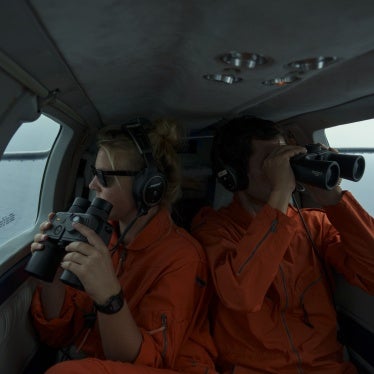A European coast guard ship participating in a Frontex operation spots a small motorboat in the Mediterranean. It is still in international waters but moving toward Maltese waters. The people on board—crammed together in too small a space, creating too much weight for the small boat—have been traveling for days, exposed to the elements and running out of meager supplies of food and water. They are young men looking for a better life. They are unaccompanied children. They are women being trafficked to Europe. They are people of all ages fleeing persecution and conflict.
What should the Frontex patrol boat do? According to the European Commission’s recent proposal, unless the boat is in distress, Frontex should prevent the boat from entering EU waters. It should order the boat to change course, and if necessary escort the ship or the people on board to the country where the boat set sail.
Frontex, the EU’s external borders agency, is already empowered to block boats from entering EU waters under regulations adopted by the European Council in 2010. Last September. the Court of Justice of the European Union (CJEU) annulled them because they were adopted without the necessary European Parliament (EP) scrutiny, but left them in place until new regulations could be drawn up.
The commission’s proposed new regulations, submitted in mid-April, are up for discussion on June 6 in the EP civil liberties committee. But they do not go far enough to prevent wrong and dangerous decisions with enormous consequences for people’s lives.
To be fair, the proposal improves on current regulations by stressing respect for fundamental rights, and requiring Frontex patrols to screen people on board and “assess their personal circumstances to the extent possible before disembarkation.” It says patrols should take into account the human rights situation in the country the boat would return to and not take people to a country where they risk serious rights violations. Patrols, which should be trained in human rights and refugee law, would have to inform people on board of the decision, and allow them to raise any fears about such a return.
But that is not enough. All EU institutions, including Frontex, are bound to respect the Charter of Fundamental Rights, which includes the right to seek asylum. These obligations apply where Frontex has jurisdiction, within EU territorial waters. But it also applies when it has control or custody—when there is physical contact of any sort, even in international waters. The high seas are not the place to be making snap judgments about who needs protection or otherwise deserves to be admitted to EU territory and who does not.
How and where will interviews be conducted, who will be present, will there be interpreters? What sources will patrols use for information on countries of disembarkation? The proposal is silent on these crucial matters. Think of the woman who is traveling with her trafficker—will she be in a position to express herself freely? Think of the child traveling without a parent or guardian—he won’t be able to express his need for protection if his trafficker or “handler” is within earshot.
Though the proposal makes reference to Hirsi v. Italy, the landmark 2012 judgment from the European Court of Human Rights that condemned Italy for its push-backs to Libya, the commission appears to have chosen the lessons of that ruling selectively. The court found that these push-backs amounted to collective expulsions and exposed people to torture and cruel, inhuman, or degrading treatment in Libya or their countries of origin.
It also found that Italy had denied people on the migrant boats their right to an effective remedy, in this case an appeal, with their return to another country suspended until it is decided. There is nothing in the proposed Frontex regulations that would guarantee this basic safeguard against a dangerous or unfounded return.
In its September 2012 ruling, the CJEU said the European Parliament had to be involved because the council regulations gave Frontex powers that could interfere significantly with people’s fundamental rights. It’s now up to Europe’s democratically elected parliament to make sure the rights of boat migrants are fully respected.









